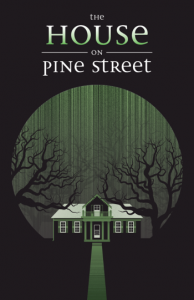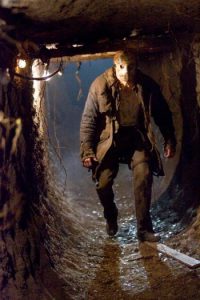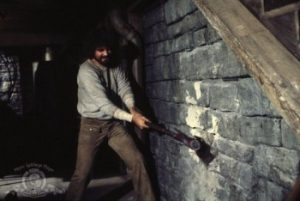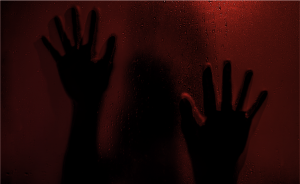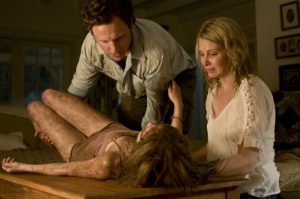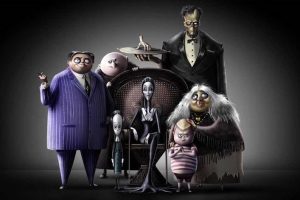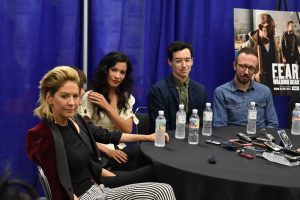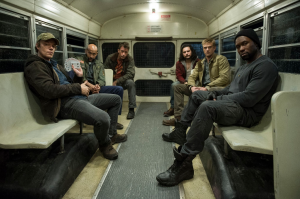The Woman in Black [2011] Review
The resurgence of Hammer has so far thrown up one underseen and underrated British based film (Wake Wood) an average remake (Let Me In) and a genuinely dreadful throwback (The Resident), but this latest production perhaps sticks closest to the formula of old.
Based on Susan Hill’s 1983 novel, The Woman in Black sees young widowed lawyer Arthur Kipps (Daniel Radcliffe) sent to a small village to collect and collate paperwork on house belonging to client who has recently died. On arrival he finds that the villagers just seem to want him to leave, and advise him against going to the house. When he finally gets to the house, Kipps believes that he has spotted another person there; the woman in black, and he sets about investigating this presence and the local legend around her.
As with many ghost story films, my issue with The Woman in Black isn’t so much one of craft – though it is flawed – as it is one of familiarity. In a way, perhaps it’s unfair to complain about a film that is built, to a large degree, around jump scares being predictable. It is perhaps inevitable that once you have seen a certain number of those films (and there has been the opportunity to see plenty, from The Others to The Orphanage, in recent years) you will learn to recognise and anticipate their rhythms, and that that will render them less effective. That was certainly what I felt during the long passaages of The Woman in Black that find Daniel Radcliffe alone, exploring the haunted house. For me, it felt almost like watching a beautifully designed clockwork mechanism; I appreciated the precision with which everything was wheeled into place, but it didn’t have any real effect on me. One shot – involving a rocking chair – made everyone else in the cinema jump, but I had figured out what was about to happen, and the timing of it, which is the kiss of death for scares like these.
Radcliffe isn’t bad here, but he feels miscast. He’s supposed to be young, sure, but he’s also supposed to be the parent of a four year old, and even with the permanent five o’clock shadow he’s acquired for this role Radcliffe looks younger than his 22 years. That said, this is a strong departure from Harry Potter, and Radcliffe has presence in the long sequences when it is only him on screen. Unfortunately the characterisation is thin. The film tries, late on, to make the imminent arrival of Arthur’s Son to the village into something of a ticking clock, but that relationship holds little weight because we see so little of it and up until that point the you could be forgiven for forgetting that Arthur has a son.
Ciaran Hinds and Janet McTeer add dramatic weight to the film with their roles as the only couple in the village who actually welcome Arthur, and their backstory actually ends up hitting harder than Arthur’s, because you really see the effect their loss has had on them. Unfortunately the other supporting characters are underdeveloped, and there are several storylines that seem to have been trimmed in order to maintain the brief 95 minute running time. For instance an interesting dynamic between Arthur and a local barmaid gets set up, but is never really developed, and the villagers seem like caricatures. This is a shame, because what’s going on in the village, with a seeming epidemic of violent death among the young population, is more interesting and more frightening than the boo scare based scenes involving the titular woman in black.
This isn’t to say that director James Watkins (whose last film was the much overrated hoodie horror Eden Lake) has made a terrible film. There are some truly striking shots on show here, strong use of limited light (the candle lit shots of Radcliffe exploring the house are great) and great attention is paid to period detail. To be fair I did see that the rest of my audience were much more affected by the film than I was, and that’s a testament to how precisely crafted the scare sequences are, but their very precision is really my issue with them, because it meant they never surprised, and thus never scared, me. The great haunted house films – The Innocents, Robert Wise’s The Haunting – have an oppressive atmosphere that grips and primes you for the jump scares, and that’s what I felt was missing here. I didn’t feel any real connection with Arthur Kipps, and his relationship to this place and these events feels somewhat tangential, I think a prequel about the events in the village would have been much more interesting and much more frightening.
I wanted to like The Woman in Black, and while I can see how and why it worked for others, it just didn’t grab me in the same way. It’s not an issue of there not being gore, nor of certain shots having been darkened to appease the BBFC in a quest for a 12A rating (which remains ridiculous, there is no way on Earth this is suitable for ten year olds), I hate to be so simplistic about it, but for whatever other qualities it has, The Woman in Black just didn’t scare me.
5 / 10



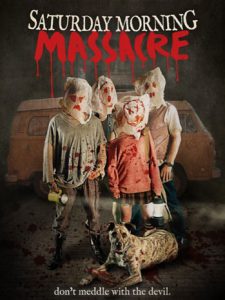
![Love in the Time of Monsters [Review]](https://www.horror-movies.ca/wp-content/uploads/2021/04/Love-in-the-Time-of-Monsters-Poster-350x531-1-198x300.jpg)
![Fantasia 2018: Puppet Master: The Littlest Reich [Review]](https://www.horror-movies.ca/wp-content/uploads/2021/04/PMLR12-UDO-KIER-350x216-1-300x185.jpg)
![[Horror Short Review] Cindy Maples’ Random](https://www.horror-movies.ca/wp-content/uploads/2021/04/Random-Poster-350x524-1-200x300.jpg)
